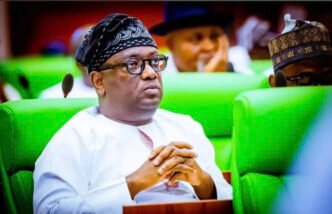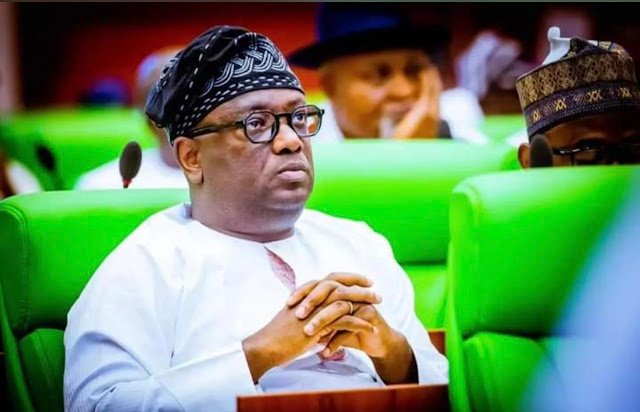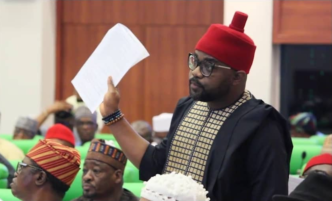HB. 1406-A BILL FOR AN ACT TO ALTER THE CONCURRENT LEGISLATIVE LIST OF THE SECOND SCHEDULE TO THE CONSTITUTION OF THE FEDERAL REPUBLIC OF NIGERIA 1999, TO INSERT A NEW PARAGRAPH WHICH PROVIDES FOR “ROAD TOLL” . Bill sponsored by Hon. Babajimi Benson. Bill progress: Committee Stage.
This Bill seeks to alter the Concurrent Legislative List of the Second Schedule to the Constitution, to insert a new paragraph which provides for ‘Road Toll’. This is to enable the National Assembly and the State Houses of Assembly to make laws authorizing the tolling (installation and management of toll gates and tolling systems) of Federal roads and State roads respectively
A new legislative proposal in Nigeria, known as HB. 1406, aims to address a significant concern in road infrastructure funding by permitting the collection of road tolls by both Federal and State Governments. The bill seeks to amend the Concurrent Legislative List of the 1999 Constitution by adding a new provision that explicitly recognizes “Road Toll.”
The central objective of HB. 1406 is to provide a constitutional framework for the collection of road tolls, which have been a contentious issue in Nigeria for many years. Road tolls previously existed but were abolished nationwide in 2004 under the administration of former President Olusegun Obasanjo. Since then, discussions about reintroducing tolls have surfaced repeatedly, spurred by the urgent need for reliable funding to develop and maintain the nation’s roads.
Currently, the Constitution does not explicitly mention “Road Toll,” leaving a grey area that complicates efforts by either level of government to implement an effective tolling system. This legal ambiguity increases the potential for disputes regarding jurisdiction and authority to impose tolls, hindering the development of much-needed infrastructure.
Nigeria faces a significant infrastructure deficit, particularly in its road network. Reliable roads are essential for fostering economic activity, but their construction and upkeep require substantial funding. Traditional budget allocations have proven inadequate to meet these demands. In this context, road tolls are viewed as a viable alternative funding mechanism, allowing users to pay for the upkeep of the roads they utilize, thus easing the burden on general government revenues.
Moreover, establishing a constitutional basis for road tolls could encourage private investment through Public-Private Partnerships (PPPs). Clear legal mechanisms for revenue generation would make PPP projects more attractive to potential investors looking to engage in road development and management.
If passed, HB. 1406 would empower both the Federal and State Governments to legislate on and collect tolls within their jurisdictions. This constitutional amendment carries several anticipated benefits. Firstly, the introduction of road tolls would create a stable and specific funding source for road projects, facilitating better planning for maintenance and new construction. Secondly, consistent revenue might lead to significantly improved road quality across Nigeria, reducing travel times, vehicle maintenance costs, and accident rates.
Proponents argue that the proposal aligns with the “user-pay” principle, where those who utilize the roads contribute directly to their upkeep. Additionally, it would enable states to generate independent revenue for their road networks, fostering fiscal decentralization and reducing dependence on federal funding.
However, critics express concerns regarding the potential drawbacks of implementing road tolls. One major argument against the proposal is that tolls could increase the cost of living and doing business in Nigeria, ultimately leading to higher transportation costs for citizens and businesses. Furthermore, there are equity concerns; lower-income individuals who rely on roads for daily commutes or livelihoods may be disproportionately affected if no alternative routes are available.
Additionally, fears exist over the potential for corruption and revenue mismanagement if there are insufficient oversight mechanisms. Implementing efficient and transparent toll collection systems also presents challenges, as does managing traffic flow and ensuring security at toll plazas.
Public acceptance of road tolls could prove to be another significant hurdle. Resistance may arise if the benefits of improved roads are not immediately evident, or if toll rates are perceived to be excessive. Furthermore, if both federal and state governments implement tolls, the risk of multiple toll points within a short distance could frustrate motorists.
HB. 1406 is sponsored by Hon. Jonathan Gaza Gbefwi and several others, indicating strong legislative support for the proposal. The process for the bill to become law requires it to pass through several stages, including securing a two-thirds majority in both the House of Representatives and the Senate. Additionally, it must receive approval from two-thirds of the State Houses of Assembly—at least 24 out of 36 states—and finally gain Presidential assent.
In conclusion, HB. 1406 represents a proactive approach to addressing Nigeria’s chronic funding deficit in road infrastructure. By providing a pathway for the collection of road tolls, the bill aims to unlock a potentially substantial revenue stream for road development. However, its successful implementation will depend on transparent management, equitable pricing, and clear communication of benefits to the public, ensuring that the funds generated are effectively utilized for the intended purpose of enhancing road infrastructure across Nigeria.













